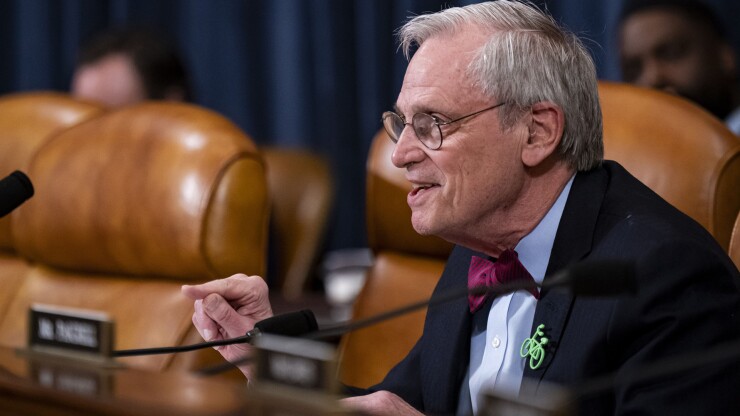Legislation has been reintroduced in both the Senate and House that would allow regulated banks to work with state-legal cannabis companies, potentially further unlocking the revenue potential of the cannabis business for banks, states, and localities.
Sens. Jeff Merkley, D-Ore. and Steve Daines, R-Mont., introduced the Secure and Fair Enforcement (SAFE) Banking Act of 2023 on Wednesday and Reps. Earl Blumenauer, D-Ore. and Dave Joyce, R-Ohio, introduced its companion in the House.
"It is past time that Congress addresses the irrational, unfair, and unsafe prohibition of basic banking services to state-legal cannabis businesses," said Rep. Blumenauer, who is also the founder and co-chair of the Congressional Cannabis Caucus. "The House has passed the SAFE Banking Act on a bipartisan basis seven times. I am delighted that the Senate is joining us in making it a priority."
The bill, which has yet to reach the Senate floor in its many iterations, would prohibit federal banking regulators from prohibiting, penalizing and discouraging banks from providing financial services to state-sanctioned and regulated cannabis businesses, or affiliates providing services to those businesses, such as lawyers or landlords.

It would stop regulators from terminating or limiting a bank's federal deposit insurance for reasons of providing services to a state-sanctioned cannabis business, would stop them from recommending or incentivizing a bank to halt or downgrade any kind of banking services to the businesses as well as prevent regulators from taking any action on a loan to an owner or operator of a cannabis business.
Bills of this sort have been introduced many times since individual states began legalizing cannabis a decade ago, but this is the first one that explicitly extends the safe harbor to ensure that the Community Development Financial Institutions and Minority Depository Institutions can serve cannabis businesses. The SAFE Banking Act would also require banks to comply with the current Financial Crimes Enforcement Network.
The proposed bills are being pitched as a tool to protect local businesses and communities against potential crime.
"Forcing legal businesses to operate in all-cash is dangerous for our communities; it's an open invitation to robbery, money laundering, and organized crime—and it's way past time to fix it," said Sen. Merkley. "For the first time, we have a path for SAFE Banking to move through the Senate Banking Committee and get a vote on the floor of the Senate. Let's make 2023 the year that we get this bill signed into law so we can ensure that all legal cannabis businesses have access to the financial services they need to help keep their employees, their businesses, and their communities safe."
"Montanans should be able to conduct their small business without fearing for their safety," said Sen. Daines. "My bipartisan bill would provide the security and peace of mind that legal Montana cannabis businesses need to freely use banks, credit union and other financial products without a fear of punishment. This bill will help keep our Montana communities safe, keep crime off the streets, support Montana small businesses and bolster local economies."
"As it stands, the federal government has denied state-legal cannabis companies the same access to financial services as every other legal business across the Buckeye State and our country," said Rep. Joyce, co-chair of the Congressional Cannabis Caucus. "Not only does this distort the market in a growing industry, but it also forces businesses to operate in all cash, making them and their employees sitting ducks for violent robberies. The bipartisan SAFE Banking Act will allow cannabis businesses to operate legally without fear of punishment by federal regulators, making our communities safer."
According to the Congressional Cannabis Coalition, 2022 was a "historic year" for cannabis reform following President Biden signing into law the Medical Marijuana and Cannabidiol Research Expansion Act, a significant policy breakthrough, law firm Arnold and Porter said. They're hoping that momentum continues this year.
Senate Majority Leader Chuck Schumer, D-N.Y., also expressed his support for the bill, and said he would work to ensure the bill includes criminal justice provisions when it reaches the Senate floor.
Both the House and Senate versions are backed by multiple additional co-sponsors on both sides of the aisle, bolstering hope that the bill may be able make it across the finish line this time.





